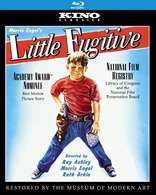Little Fugitive Blu-ray Movie
HomeLittle Fugitive Blu-ray Movie 
Special EditionKino Lorber | 1953 | 80 min | Unrated | Mar 26, 2013
Movie rating
7.5 | / 10 |
Blu-ray rating
| Users | 4.5 | |
| Reviewer | 4.0 | |
| Overall | 4.0 |
Overview
Little Fugitive (1953)
When a seven-year-old boy is tricked into believing he killed his older brother, he gathers his meager possessions and flees to New York's nether wonderland: Coney Island. Upon and beneath the crowded boardwalk, Joey experiences a day and a night filled with adventures and mysteries, resulting in a film that's spontaneous and delightful.
Starring: Richard Brewster, Winifred Cushing, Jay Williams (I), Will Lee (IV), Charlie MossDirector: Morris Engel, Ruth Orkin, Ray Ashley
| Coming of age | Uncertain |
| Drama | Uncertain |
| Family | Uncertain |
| Adventure | Uncertain |
Specifications
Video
Video codec: MPEG-4 AVC
Video resolution: 1080p
Aspect ratio: 1.32:1
Original aspect ratio: 1.37:1
Audio
English: LPCM Mono
Subtitles
None
Discs
50GB Blu-ray Disc
Single disc (1 BD)
Playback
Region A (locked)
Review
Rating summary
| Movie | 4.5 | |
| Video | 4.0 | |
| Audio | 4.0 | |
| Extras | 3.0 | |
| Overall | 4.0 |
Little Fugitive Blu-ray Movie Review
Childhood, Coney Island, and the Birth of American Independent Cinema
Reviewed by Casey Broadwater March 21, 2013Little Fugitive is pure cinema, pure childhood, and arguably the first truly successful American independent film. Co-directed by photojournalist
Morris Engel—who shot it—his girlfriend, Ruth Orkin—who edited it—and writer Ray Ashley, the 1953 production was made for only $30,000, filmed on
the fly in Brooklyn using a discrete handheld 35mm camera. Like the 1930 German film People on a Sunday, and certainly inspired by the
recent Italian neo-realists, Little Fugitive has an almost proto-vérité quality, using non-professional actors in a live, real-world setting—in this
case, the festive summertime stretch of Coney Island, with its throngs of beach-goers, 10¢ amusements, and rickety carnival rides.
Documentarians
D.A. Pennebaker and Albert Maysles were admirers—soon adopting lightweight cameras for their own work—and the film got a permanent blurb when
none other than Nouvelle Vague pioneer François Truffaut wrote, "Our New Wave would never have come into being if it hadn't been for the young
American Morris Engel, who showed us the way to independent production with his fine movie Little Fugitive." After taking the Silver Lion prize
at the Venice Film Festival, the little docu-drama-that-could played in almost 5,000 U.S. theaters—an unheard-of number for contemporary indie
filmmakers—and was even nominated for an Academy Award for Best Story.
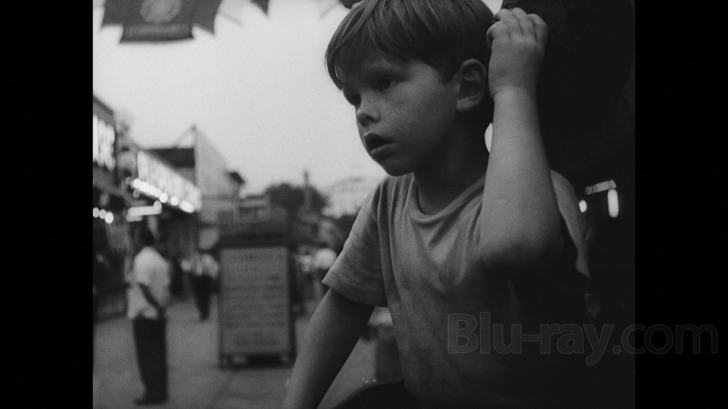
The Coney Island Kid
The Oscar nod seems strange, because Little Fugitive's narrative is sparse to the point of minimalism. Richie Andrusco, who would never appear in another film, plays Joey, a guileless seven-year-old who looks like a miniature James Dean in cuffed blue jeans, Jack Purcells, and a white t- shirt, a cap pistol dangling in a holster from his belt. He's the typical tag-along kid brother to the slightly older Lennie (Richard Brewster), who begrudgingly lets Joey hang out with him and his neighborhood pals as they play street baseball and throw rocks at cans. Off to visit their sick grandma for twenty-four hours, the fatherless boys' mother (Winifred Cushing) leaves Lennie in charge and tells them to stay at home, but of course that doesn't happen. Down by the river, Lennie and his buddies pull a cruel prank on Joey, giving him a toy rifle and then convincing him that he's shot and killed his brother, who's lying motionless with ketchup smeared on his shirt. Less mournful than worried that the cops will catch him, Joey flees the scene, running terrified onto a train bound for Coney Island. Thus the Little Fugitive's journey begins; he's a junior Odysseus, setting out from home on an unexpected adventure filled with small victories, episodic encounters with strangers, and a kiddy-sized dose of danger.
There's not much to the rest of the film, plot-wise, but there doesn't need to be. What follows is a day in the life of a precocious seven-year-old, who— with only a few coins in his back pocket and a rare sense of bravery—is free to do entirely as he pleases in the shabby seaside heaven of 1950s Coney Island. And he does pretty much what you'd expect an especially confident kid his age to do. He rides the carousel and eats a hotdog. He gets his picture taken behind a painted plywood cutout of a cowboy. He swings and misses in the batting cage, masters knocking down milk bottles, and gnaws a hunk of watermelon down to the rind. After skee-ball and bumper-boats, cotton candy and corn on the cob, Joey's funds are dwindling, and when he finally comes across the pony ride—we already know he loves cowboy shows and horses—he's disappointed to find he's short on coinage. In the film's best sequence, he learns from a boy on the beach how to return glass bottles to the recycling center for money, and he earns enough to take several pony rides, his freckled face growing increasingly elated as he goes from a walk to a trot to a canter. Joey also befriends the kindly pony ride attendant (Jay Williams), a skinny urban cowpoke who becomes a sort of temporary father figure, telling him stories, teaching how to rope—using his imagination —and ultimately helping the lost boy get back to where he belongs.
If the story seems unexceptional in writing, its simplicity is actually its greatest asset. This isn't a film about dense plotting; it's about atmosphere—you can practically smell the salt air—and the intersection of reality and fiction. Morris Engel's black and white handheld cinematography turns it into something truly magical, capturing the awe of a child encountering the world on his own terms for the first time, whether it's the way Joey casually pets his wooden carousel steed or the curiosity with which he observes the slatted sunshine falling in chiaroscuro lines on the sand beneath the boardwalk. (It certainly helps that Richie Andrusco's lightening-in-a-bottle performance is so natural and unaffected.) Engel's background in street photography is evidenced in the film's striking compositions, and he uses natural light extremely effectively to indicate the passage of time. This loose documentarian filming style had a clear impact on the aesthetic development of the French New Wave directors, whose low budgets and unconventional stories also forced them to shoot quickly on location with portable cameras. Little Fugitive looks effortless, so much so you might believe it was shot over a single day, with Engels trailing his child star at eye level, taking in the real-life Coney Island ambience and preserving it for us future onlookers who are nostalgic for a past we'll never experience.
Little Fugitive Blu-ray Movie, Video Quality 
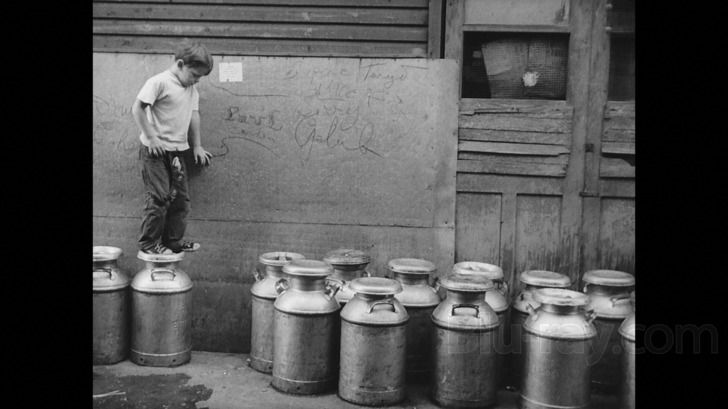
Mastered from a 35mm print preserved by the Museum of Modern Art—with assistance from The Film Foundation, The National Endowment for the Arts, and the Celeste Bartos Fund for Film Preservation—Little Fugitive's 1080p/AVC-encoded transfer looks wonderful, providing you don't expect an absolutely pristine image. Like a lot of Kino-Lorber titles, the film is essentially presented "as-is," so you will notice some age-related damage, including black and white specks, occasional hairs stuck at the edge of the frame, and brief vertical scratches. None of this is particularly distracting, but you can imagine how breathtaking the film would look if it had been given the sort of frame-by-frame restoration usually seen on Criterion or big studio releases. Otherwise, Little Fugitive is a real pleasure to watch here. On the flip-side of Kino's hands-off approach, no obvious edge enhancement or grain-erasing DNR has been applied, so the image looks natural and clearly filmic, preserving Morris Engel's striking photojournalistic cinematography. Clarity-wise, the picture looks to be as resolved as is possible given the source materials, and the black and white contrast balance is excellent, with deep blacks and highlights that are crisp but never overblown.
Little Fugitive Blu-ray Movie, Audio Quality 
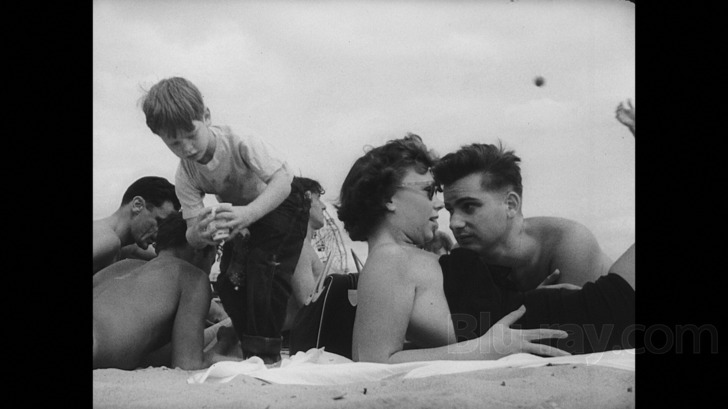
Like the picture quality, the uncompressed Linear PCM 2.0 mono track Kino offers us here has its age/budget-related quirks—some light crackling, a low- level tape hiss—but the mix is never abrasive, and always listenable. Although Little Fugitive was shot silently—Engel wouldn't develop the tech to shoot portable sync-sound until his 1960 feature Weddings and Babies—the after-the-fact dubbing of the effects, ambience, and voices is actually quite good, with only a few moments of he's clearly not saying that there disjointedness. Everything sounds realistic—the carnival clamor, the pouring rain, even footsteps—and the aw-shucks Brooklyn dialogue is always easy to understand. (Which is good, because Kino has once again neglected to include any subtitle options.) The film's aural highlight, though, is the lonesome harmonica score that accompanies little Joey's big journey.
Little Fugitive Blu-ray Movie, Special Features and Extras 
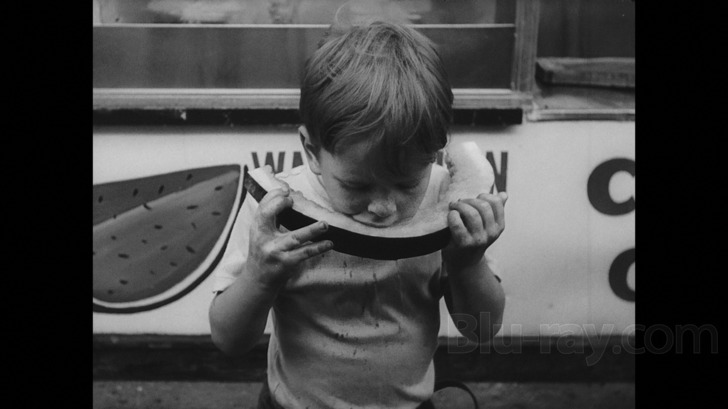
- Audio Commentary: Morris Engel recorded this wonderful commentary track in 1999, guiding us through the history of the film's creation. Engel's memory is sharp, and he doles out one memory from the production after another, including the revelation that there was a real bullet in the rifle Joey uses to "kill" his brother. A great listen.
- Morris Engel: The Independent (SD, 28:38): Morris' daughter, Mary, made this short documentary about her father's career in 2008, covering his childhood in Coney Island, his still photography, and his feature films. Best bit? Seeing Morris stroll the boardwalk in 1999 with his former leading boy, Richie Andrusco, visiting their old haunts. Also includes interviews with D.A. Pennebaker and Albert Maysles.
- Ruth Orkin: Frames of Life (SD, 18:19): Likewise, Mary made this documentary about her mother—Little Fugitive's co-writer, producer, and editor—in 1995.
- Theatrical Trailer (HD, 1:52)
- Image Gallery (HD): A remote-controlled gallery with 31 stills.
Little Fugitive Blu-ray Movie, Overall Score and Recommendation 
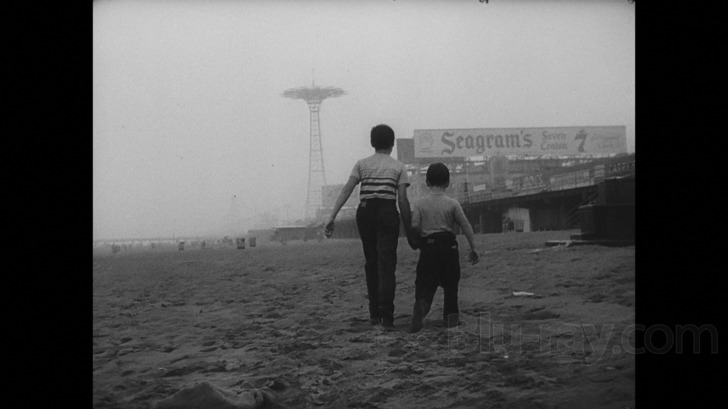
A rare glimpse at the Coney Island of yore, a slice-of-life look at 1950s childhood, a mythic journey by a junior Odysseus—Little Fugitive is all of the above. Though lauded by Scorsese, Cassavetes, and Truffaut, this under-seen and under-appreciated piece of early independent American cinema deserves a wider audience, and hopefully Kino-Lorber's fantastic new Blu-ray release will help it find just that. Think of it as an arthouse family film; kids too young to have been spoiled by high-energy television may enjoy its straightforward adventure, while adults of all ages will be overwhelmed by a tide of nostalgia for simpler times. Highly recommended!
Similar titles
Similar titles you might also like

Zama
2017

24 Frames
2017

Insignificance
1985

Shadows
1958

Forbidden Games
Jeux interdits
1952

The Florida Project
2017

The Black Stallion
1979

Crooklyn
1994

My Life as a Dog
Mitt liv som hund
1985

Mysterious Skin
Director's Special Blu-ray Edition
2004

Free Willy
1993

Blancanieves
Snow White
2012

Under the Sand
Sous le sable
2000

The Thief of Bagdad
1940

Death in Venice
Morte a Venezia
1971

Okja 4K
옥자
2017

Aquarius
2016

Cemetery of Splendor
2015

Neon Bull
Boi Neon
2015

Mustang
2015
